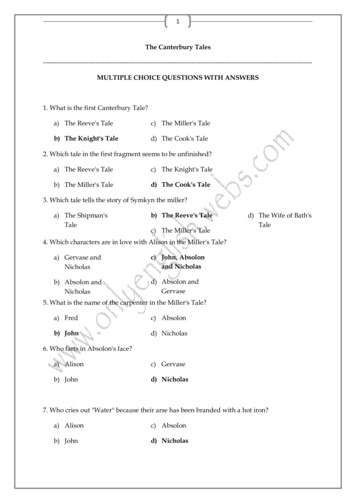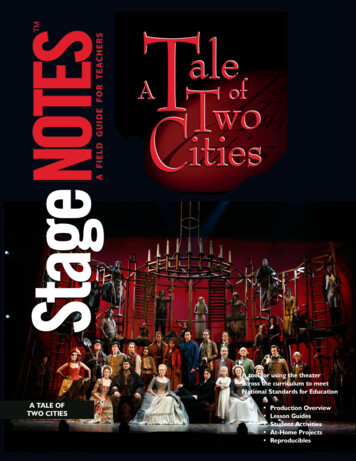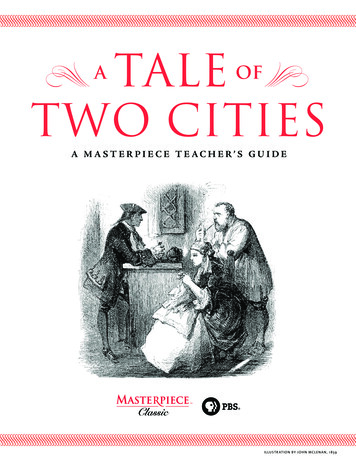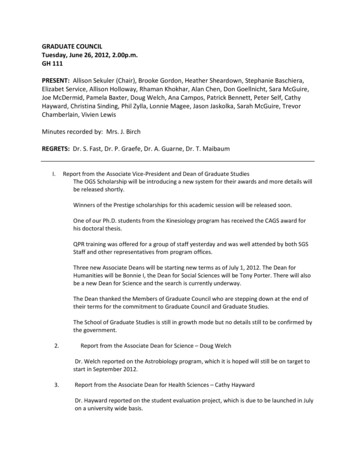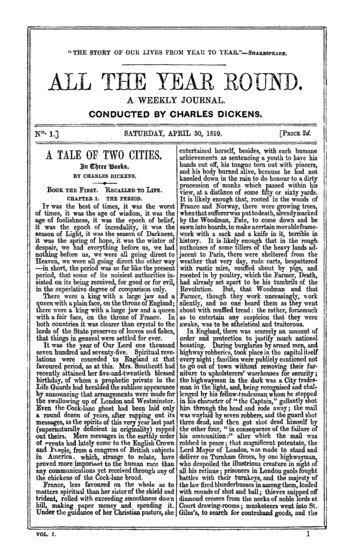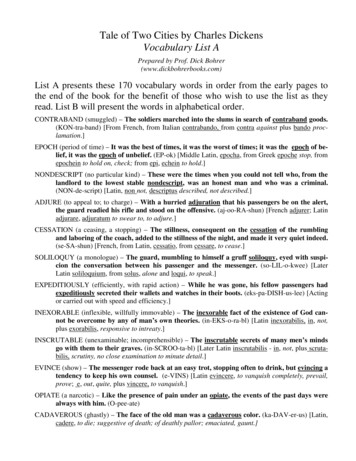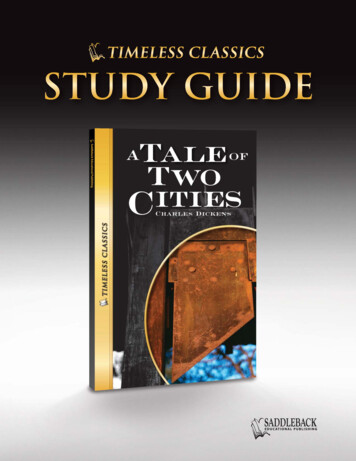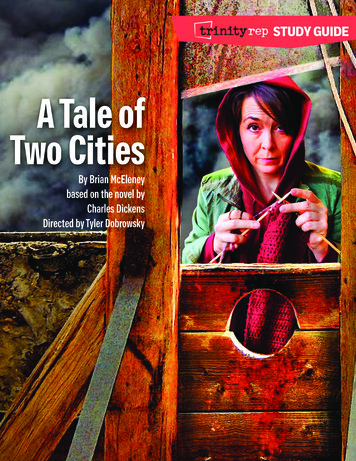
Transcription
A Tale of Two CitiesBy Charles Dickens (1859)Download free eBooks of classic literature, books andnovels at Planet eBook. Subscribe to our free eBooks blogand email newsletter.
Book the First—Recalled to Life A tale of two cities
IThe PeriodIt was the best of times, it was the worst of times, it wasthe age of wisdom, it was the age of foolishness, it wasthe epoch of belief, it was the epoch of incredulity, it wasthe season of Light, it was the season of Darkness, it wasthe spring of hope, it was the winter of despair, we had everything before us, we had nothing before us, we were allgoing direct to Heaven, we were all going direct the otherway—in short, the period was so far like the present period, that some of its noisiest authorities insisted on its beingreceived, for good or for evil, in the superlative degree ofcomparison only.There were a king with a large jaw and a queen with aplain face, on the throne of England; there were a king witha large jaw and a queen with a fair face, on the throne ofFrance. In both countries it was clearer than crystal to thelords of the State preserves of loaves and fishes, that thingsin general were settled for ever.It was the year of Our Lord one thousand seven hundred and seventy-five. Spiritual revelations were concededto England at that favoured period, as at this. Mrs. SouthFree eBooks at Planet eBook.com
cott had recently attained her five-and-twentieth blessedbirthday, of whom a prophetic private in the Life Guardshad heralded the sublime appearance by announcing thatarrangements were made for the swallowing up of Londonand Westminster. Even the Cock-lane ghost had been laidonly a round dozen of years, after rapping out its messages,as the spirits of this very year last past (supernaturally deficient in originality) rapped out theirs. Mere messages in theearthly order of events had lately come to the English Crownand People, from a congress of British subjects in America:which, strange to relate, have proved more important to thehuman race than any communications yet received throughany of the chickens of the Cock-lane brood.France, less favoured on the whole as to matters spiritual than her sister of the shield and trident, rolled withexceeding smoothness down hill, making paper money andspending it. Under the guidance of her Christian pastors,she entertained herself, besides, with such humane achievements as sentencing a youth to have his hands cut off, histongue torn out with pincers, and his body burned alive, because he had not kneeled down in the rain to do honour toa dirty procession of monks which passed within his view,at a distance of some fifty or sixty yards. It is likely enoughthat, rooted in the woods of France and Norway, there weregrowing trees, when that sufferer was put to death, alreadymarked by the Woodman, Fate, to come down and be sawninto boards, to make a certain movable framework with asack and a knife in it, terrible in history. It is likely enoughthat in the rough outhouses of some tillers of the heavy lands A tale of two cities
adjacent to Paris, there were sheltered from the weather thatvery day, rude carts, bespattered with rustic mire, snuffedabout by pigs, and roosted in by poultry, which the Farmer,Death, had already set apart to be his tumbrils of the Revolution. But that Woodman and that Farmer, though theywork unceasingly, work silently, and no one heard them asthey went about with muffled tread: the rather, forasmuchas to entertain any suspicion that they were awake, was tobe atheistical and traitorous.In England, there was scarcely an amount of order andprotection to justify much national boasting. Daring burglaries by armed men, and highway robberies, took place inthe capital itself every night; families were publicly cautionednot to go out of town without removing their furniture toupholsterers’ warehouses for security; the highwaymanin the dark was a City tradesman in the light, and, beingrecognised and challenged by his fellowtradesman whomhe stopped in his character of ‘the Captain,’ gallantly shothim through the head and rode away; the mall was waylaidby seven robbers, and the guard shot three dead, and thengot shot dead himself by the other four, ‘in consequence ofthe failure of his ammunition:’ after which the mall wasrobbed in peace; that magnificent potentate, the Lord Mayor of London, was made to stand and deliver on TurnhamGreen, by one highwayman, who despoiled the illustriouscreature in sight of all his retinue; prisoners in Londongaols fought battles with their turnkeys, and the majestyof the law fired blunderbusses in among them, loaded withrounds of shot and ball; thieves snipped off diamond crossFree eBooks at Planet eBook.com
es from the necks of noble lords at Court drawing-rooms;musketeers went into St. Giles’s, to search for contrabandgoods, and the mob fired on the musketeers, and the musketeers fired on the mob, and nobody thought any of theseoccurrences much out of the common way. In the midst ofthem, the hangman, ever busy and ever worse than useless,was in constant requisition; now, stringing up long rowsof miscellaneous criminals; now, hanging a housebreakeron Saturday who had been taken on Tuesday; now, burning people in the hand at Newgate by the dozen, and nowburning pamphlets at the door of Westminster Hall; to-day,taking the life of an atrocious murderer, and to-morrow ofa wretched pilferer who had robbed a farmer’s boy of sixpence.All these things, and a thousand like them, came to passin and close upon the dear old year one thousand sevenhundred and seventy-five. Environed by them, while theWoodman and the Farmer worked unheeded, those two ofthe large jaws, and those other two of the plain and the fairfaces, trod with stir enough, and carried their divine rightswith a high hand. Thus did the year one thousand sevenhundred and seventy-five conduct their Greatnesses, andmyriads of small creatures—the creatures of this chronicleamong the rest—along the roads that lay before them. A tale of two cities
IIThe MailIt was the Dover road that lay, on a Friday night late inNovember, before the first of the persons with whom thishistory has business. The Dover road lay, as to him, beyondthe Dover mail, as it lumbered up Shooter’s Hill. He walkedup hill in the mire by the side of the mail, as the rest ofthe passengers did; not because they had the least relish forwalking exercise, under the circumstances, but because thehill, and the harness, and the mud, and the mail, were allso heavy, that the horses had three times already come to astop, besides once drawing the coach across the road, withthe mutinous intent of taking it back to Blackheath. Reinsand whip and coachman and guard, however, in combination, had read that article of war which forbade a purposeotherwise strongly in favour of the argument, that somebrute animals are endued with Reason; and the team hadcapitulated and returned to their duty.With drooping heads and tremulous tails, they mashedtheir way through the thick mud, floundering and stumbling between whiles, as if they were falling to pieces at thelarger joints. As often as the driver rested them and broughtFree eBooks at Planet eBook.com
them to a stand, with a wary ‘Wo-ho! so-hothen!’ the nearleader violently shook his head and everything upon it—likean unusually emphatic horse, denying that the coach couldbe got up the hill. Whenever the leader made this rattle, thepassenger started, as a nervous passenger might, and wasdisturbed in mind.There was a steaming mist in all the hollows, and it hadroamed in its forlornness up the hill, like an evil spirit,seeking rest and finding none. A clammy and intensely coldmist, it made its slow way through the air in ripples that visibly followed and overspread one another, as the waves of anunwholesome sea might do. It was dense enough to shut outeverything from the light of the coach-lamps but these itsown workings, and a few yards of road; and the reek of thelabouring horses steamed into it, as if they had made it all.Two other passengers, besides the one, were ploddingup the hill by the side of the mail. All three were wrappedto the cheekbones and over the ears, and wore jack-boots.Not one of the three could have said, from anything he saw,what either of the other two was like; and each was hidden under almost as many wrappers from the eyes of themind, as from the eyes of the body, of his two companions.In those days, travellers were very shy of being confidentialon a short notice, for anybody on the road might be a robber or in league with robbers. As to the latter, when everyposting-house and ale-house could produce somebody in‘the Captain’s’ pay, ranging from the landlord to the lowest stable non-descript, it was the likeliest thing upon thecards. So the guard of the Dover mail thought to himself, A tale of two cities
that Friday night in November, one thousand seven hundred and seventy-five, lumbering up Shooter’s Hill, as hestood on his own particular perch behind the mail, beatinghis feet, and keeping an eye and a hand on the arm-chestbefore him, where a loaded blunderbuss lay at the top of sixor eight loaded horse-pistols, deposited on a substratum ofcutlass.The Dover mail was in its usual genial position that theguard suspected the passengers, the passengers suspectedone another and the guard, they all suspected everybodyelse, and the coachman was sure of nothing but the horses; as to which cattle he could with a clear conscience havetaken his oath on the two Testaments that they were not fitfor the journey.‘Wo-ho!’ said the coachman. ‘So, then! One more pulland you’re at the top and be damned to you, for I have hadtrouble enough to get you to it!—Joe!’‘Halloa!’ the guard replied.‘What o’clock do you make it, Joe?’‘Ten minutes, good, past eleven.’‘My blood!’ ejaculated the vexed coachman, ‘and notatop of Shooter’s yet! Tst! Yah! Get on with you! ‘The emphatic horse, cut short by the whip in a mostdecided negative, made a decided scramble for it, and thethree other horses followed suit. Once more, the Dover mailstruggled on, with the jack-boots of its passengers squashing along by its side. They had stopped when the coachstopped, and they kept close company with it. If any one ofthe three had had the hardihood to propose to another toFree eBooks at Planet eBook.com
walk on a little ahead into the mist and darkness, he wouldhave put himself in a fair way of getting shot instantly as ahighwayman.The last burst carried the mail to the summit of the hill.The horses stopped to breathe again, and the guard gotdown to skid the wheel for the descent, and open the coachdoor to let the passengers in.‘Tst! Joe!’ cried the coachman in a warning voice, looking down from his box.‘What do you say, Tom?’They both listened.‘I say a horse at a canter coming up, Joe.’‘I say a horse at a gallop, Tom,’ returned the guard, leaving his hold of the door, and mounting nimbly to his place.‘Gentlemen! In the kings name, all of you!’With this hurried adjuration, he cocked his blunderbuss,and stood on the offensive.The passenger booked by this history, was on the coachstep, getting in; the two other passengers were close behindhim, and about to follow. He remained on the step, half inthe coach and half out of; they re-mained in the road belowhim. They all looked from the coachman to the guard, andfrom the guard to the coachman, and listened. The coachman looked back and the guard looked back, and even theemphatic leader pricked up his ears and looked back, without contradicting.The stillness consequent on the cessation of the rumbling and labouring of the coach, added to the stillness ofthe night, made it very quiet indeed. The panting of the10A tale of two cities
horses communicated a tremulous motion to the coach, asif it were in a state of agitation. The hearts of the passengersbeat loud enough perhaps to be heard; but at any rate, thequiet pause was audibly expressive of people out of breath,and holding the breath, and having the pulses quickened byexpectation.The sound of a horse at a gallop came fast and furiouslyup the hill.‘So-ho!’ the guard sang out, as loud as he could roar. ‘Yothere! Stand! I shall fire!’The pace was suddenly checked, and, with much splashing and floundering, a man’s voice called from the mist, ‘Isthat the Dover mail?’‘Never you mind what it is!’ the guard retorted. ‘Whatare you?’‘IS that the Dover mail?’‘Why do you want to know?’‘I want a passenger, if it is.’‘What passenger?’‘Mr. Jarvis Lorry.’Our booked passenger showed in a moment that it washis name. The guard, the coachman, and the two other passengers eyed him distrustfully.‘Keep where you are,’ the guard called to the voice in themist, ‘because, if I should make a mistake, it could never beset right in your lifetime. Gentleman of the name of Lorryanswer straight.’‘What is the matter?’ asked the passenger, then, withmildly quavering speech. ‘Who wants me? Is it Jerry?’Free eBooks at Planet eBook.com11
(“I don’t like Jerry’s voice, if it is Jerry,’ growled the guardto himself. ‘He’s hoarser than suits me, is Jerry.’)‘Yes, Mr. Lorry.’‘What is the matter?’‘A despatch sent after you from over yonder. T. and Co.’‘I know this messenger, guard,’ said Mr. Lorry, gettingdown into the road—assisted from behind more swiftlythan politely by the other two passengers, who immediatelyscrambled into the coach, shut the door, and pulled up thewindow. ‘He may come close; there’s nothing wrong.’‘I hope there ain’t, but I can’t make so ‘Nation sure ofthat,’ said the guard, in gruff soliloquy. ‘Hallo you!’‘Well! And hallo you!’ said Jerry, more hoarsely than before.‘Come on at a footpace! d’ye mind me? And if you’ve gotholsters to that saddle o’ yourn, don’t let me see your handgo nigh ‘em. For I’m a devil at a quick mistake, and whenI make one it takes the form of Lead. So now let’s look atyou.’The figures of a horse and rider came slowly through theeddying mist, and came to the side of the mail, where thepassenger stood. The rider stooped, and, casting up his eyesat the guard, handed the passenger a small folded paper.The rider’s horse was blown, and both horse and rider werecovered with mud, from the hoofs of the horse to the hat ofthe man.‘Guard!’ said the passenger, in a tone of quiet businessconfidence.The watchful guard, with his right hand at the stock of12A tale of two cities
his raised blunderbuss, his left at the barrel, and his eye onthe horseman, answered curtly, ‘Sir.’‘There is nothing to apprehend. I belong to Tellson’sBank. You must know Tellson’s Bank in London. I am goingto Paris on business. A crown to drink. I may read this?’‘If so be as you’re quick, sir.’He opened it in the light of the coach-lamp on that side,and read—first to himself and then aloud: ‘Wait at Doverfor Mam’selle.’ It’s not long, you see, guard. Jerry, say thatmy answer was, RECALLED TO LIFE.’Jerry started in his saddle. ‘That’s a Blazing strange answer, too,’ said he, at his hoarsest.‘Take that message back, and they will know that I received this, as well as if I wrote. Make the best of your way.Good night.’With those words the passenger opened the coach-doorand got in; not at all assisted by his fellow-passengers, whohad expeditiously secreted their watches and purses in theirboots, and were now making a general pretence of beingasleep. With no more definite purpose than to escape thehazard of originating any other kind of action.The coach lumbered on again, with heavier wreaths ofmist closing round it as it began the descent. The guardsoon replaced his blunderbuss in his arm-chest, and, having looked to the rest of its contents, and having looked tothe supplementary pistols that he wore in his belt, lookedto a smaller chest beneath his seat, in which there were afew smith’s tools, a couple of torches, and a tinder-box.For he was furnished with that completeness that if theFree eBooks at Planet eBook.com13
coach-lamps had been blown and stormed out, which didoccasionally happen, he had only to shut himself up inside,keep the flint and steel sparks well off the straw, and get alight with tolerable safety and ease (if he were lucky) in fiveminutes.‘Tom!’ softly over the coach roof.‘Hallo, Joe.’‘Did you hear the message?’‘I did, Joe.’‘What did you make of it, Tom?’‘Nothing at all, Joe.’‘That’s a coincidence, too,’ the guard mused, ‘for I madethe same of it myself.’Jerry, left alone in the mist and darkness, dismountedmeanwhile, not only to ease his spent horse, but to wipe themud from his face, and shake the wet out of his hat-brim,which might be capable of holding about half a gallon. After standing with the bridle over his heavily-splashed arm,until the wheels of the mail were no longer within hearingand the night was quite still again, he turned to walk downthe hill.‘After that there gallop from Temple Bar, old lady, Iwon’t trust your fore-legs till I get you on the level,’ said thishoarse messenger, glancing at his mare. ‘Recalled to life.’That’s a Blazing strange message. Much of that wouldn’t dofor you, Jerry! I say, Jerry! You’d be in a Blazing bad way, ifrecalling to life was to come into fashion, Jerry!’14A tale of two cities
IIIThe Night ShadowsAwonderful fact to reflect upon, that every human creature is constituted to be that profound secret andmystery to every other. A solemn consideration, when Ienter a great city by night, that every one of those darklyclustered houses encloses its own secret; that every room inevery one of them encloses its own secret; that every beating heart in the hundreds of thousands of breasts there,is, in some of its imaginings, a secret to the heart nearestit! Something of the awfulness, even of Death itself, is referable to this. No more can I turn the leaves of this dearbook that I loved, and vainly hope in time to read it all. Nomore can I look into the depths of this unfathomable water, wherein, as momentary lights glanced into it, I have hadglimpses of buried treasure and other things submerged. Itwas appointed that the book should shut with a spring, forever and for ever, when I had read but a page. It was appointed that the water should be locked in an eternal frost,when the light was playing on its surface, and I stood inignorance on the shore. My friend is dead, my neighbouris dead, my love, the darling of my soul, is dead; it is the inFree eBooks at Planet eBook.com15
exorable consolidation and perpetuation of the secret thatwas always in that individuality, and which I shall carry inmine to my life’s end. In any of the burial-places of this citythrough which I pass, is there a sleeper more inscrutablethan its busy inhabitants are, in their innermost personality, to me, or than I am to them?As to this, his natural and not to be alienated inheritance, the messenger on horseback had exactly the samepossessions as the King, the first Minister of State, or therichest merchant in London. So with the three passengersshut up in the narrow compass of one lumbering old mailcoach; they were mysteries to one another, as complete as ifeach had been in his own coach and six, or his own coachand sixty, with the breadth of a county between him andthe next.The messenger rode back at an easy trot, stopping prettyoften at ale-houses by the way to drink, but evincing a tendency to keep his own counsel, and to keep his hat cockedover his eyes. He had eyes that assorted very well with thatdecoration, being of a surface black, with no depth in thecolour or form, and much too near together—as if they wereafraid of being found out in something, singly, if they kepttoo far apart. They had a sinister expression, under an oldcocked-hat like a three-cornered spittoon, and over a greatmuffler for the chin and throat, which descended nearly tothe wearer’s knees. When he stopped for drink, he movedthis muffler with his left hand, only while he poured his liquor in with his right; as soon as that was done, he muffledagain.16A tale of two cities
‘No, Jerry, no!’ said the messenger, harping on one themeas he rode. ‘It wouldn’t do for you, Jerry. Jerry, you honesttradesman, it wouldn’t suit YOUR line of business! Recalled—! Bust me if I don’t think he’d been a drinking!’His message perplexed his mind to that degree that hewas fain, several times, to take off his hat to scratch hishead. Except on the crown, which was raggedly bald, hehad stiff, black hair, standing jaggedly all over it, and growing down hill almost to his broad, blunt nose. It was so likeSmith’s work, so much more like the top of a strongly spikedwall than a head of hair, that the best of players at leap-frogmight have declined him, as the most dangerous man in theworld to go over.While he trotted back with the message he was to deliverto the night watchman in his box at the door of Tellson’sBank, by Temple Bar, who was to deliver it to greater authorities within, the shadows of the night took such shapesto him as arose out of the message, and took such shapes tothe mare as arose out of HER private topics of uneasiness.They seemed to be numerous, for she shied at every shadowon the road.What time, the mail-coach lumbered, jolted, rattled, andbumped upon its tedious way, with its three fellow-inscrutables inside. To whom, likewise, the shadows of the nightrevealed themselves, in the forms their dozing eyes andwandering thoughts suggested.Tellson’s Bank had a run upon it in the mail. As the bankpassenger— with an arm drawn through the leathern strap,which did what lay in it to keep him from pounding againstFree eBooks at Planet eBook.com17
the next passenger, and driving him into his corner, whenever the coach got a special jolt—nodded in his place, withhalf-shut eyes, the little coach-windows, and the coachlamp dimly gleaming through them, and the bulky bundleof opposite passenger, became the bank, and did a greatstroke of business. The rattle of the harness was the chinkof money, and more drafts were honoured in five minutesthan even Tellson’s, with all its foreign and home connection, ever paid in thrice the time. Then the strong-roomsunderground, at Tellson’s, with such of their valuable storesand secrets as were known to the passenger (and it was nota little that he knew about them), opened before him, andhe went in among them with the great keys and the feebly-burning candle, and found them safe, and strong, andsound, and still, just as he had last seen them.But, though the bank was almost always with him, andthough the coach (in a confused way, like the presence ofpain under an opiate) was always with him, there was another current of impression that never ceased to run, allthrough the night. He was on his way to dig some one outof a grave.Now, which of the multitude of faces that showed themselves before him was the true face of the buried person,the shadows of the night did not indicate; but they wereall the faces of a man of five-andforty by years, and theydiffered principally in the passions they expressed, and inthe ghastliness of their worn and wasted state. Pride, contempt, defiance, stubbornness, submission, lamentation,succeeded one another; so did varieties of sunken cheek, ca18A tale of two cities
daverous colour, emaciated hands and figures. But the facewas in the main one face, and every head was prematurelywhite. A hundred times the dozing passenger inquired ofthis spectre:‘Buried how long?’The answer was always the same: ‘Almost eighteenyears.’‘You had abandoned all hope of being dug out?’‘Long ago.’‘You know that you are recalled to life?’‘They tell me so.’‘I hope you care to live?’‘I can’t say.’‘Shall I show her to you? Will you come and see her?’The answers to this question were various and contradictory. Sometimes the broken reply was, ‘Wait! It wouldkill me if I saw her too soon.’ Sometimes, it was given in atender rain of tears, and then it was, ‘Take me to her.’ Sometimes it was staring and bewildered, and then it was, ‘I don’tknow her. I don’t understand.’After such imaginary discourse, the passenger in hisfancy would dig, and dig, dig—now with a spade, now witha great key, now with his hands—to dig this wretched creature out. Got out at last, with earth hanging about his faceand hair, he would suddenly fan away to dust. The passenger would then start to himself, and lower the window, toget the reality of mist and rain on his cheek.Yet even when his eyes were opened on the mist andrain, on the moving patch of light from the lamps, and theFree eBooks at Planet eBook.com19
hedge at the roadside retreating by jerks, the night shadows outside the coach would fall into the train of the nightshadows within. The real Banking-house by Temple Bar,the real business of the past day, the real strong rooms, thereal express sent after him, and the real message returned,would all be there. Out of the midst of them, the ghostlyface would rise, and he would accost it again.‘Buried how long?’‘Almost eighteen years.’‘I hope you care to live?’‘I can’t say.’Dig—dig—dig—until an impatient movement from oneof the two passengers would admonish him to pull up thewindow, draw his arm securely through the leathern strap,and speculate upon the two slumbering forms, until hismind lost its hold of them, and they again slid away into thebank and the grave.‘Buried how long?’‘Almost eighteen years.’‘You had abandoned all hope of being dug out?’‘Long ago.’The words were still in his hearing as just spoken—distinctly in his hearing as ever spoken words had been in hislife—when the weary passenger started to the consciousness of daylight, and found that the shadows of the nightwere gone.He lowered the window, and looked out at the rising sun.There was a ridge of ploughed land, with a plough upon itwhere it had been left last night when the horses were un20A tale of two cities
yoked; beyond, a quiet coppice-wood, in which many leavesof burning red and golden yellow still remained upon thetrees. Though the earth was cold and wet, the sky was clear,and the sun rose bright, placid, and beautiful.‘Eighteen years!’ said the passenger, looking at the sun.‘Gracious Creator of day! To be buried alive for eighteenyears!’Free eBooks at Planet eBook.com21
IVThe PreparationWhen the mail got successfully to Dover, in the courseof the forenoon, the head drawer at the Royal GeorgeHotel opened the coach-door as his custom was. He did itwith some flourish of ceremony, for a mail journey fromLondon in winter was an achievement to congratulate anadventurous traveller upon.By that time, there was only one adventurous traveller leftbe congratulated: for the two others had been set down attheir respective roadside destinations. The mildewy insideof the coach, with its damp and dirty straw, its disageeablesmell, and its obscurity, was rather like a larger dog-kennel.Mr. Lorry, the passenger, shaking himself out of it in chainsof straw, a tangle of shaggy wrapper, flapping hat, and muddy legs, was rather like a larger sort of dog.‘There will be a packet to Calais, tomorrow, drawer?’‘Yes, sir, if the weather holds and the wind sets tolerablefair. The tide will serve pretty nicely at about two in the afternoon, sir. Bed, sir?’‘I shall not go to bed till night; but I want a bedroom,and a barber.’22A tale of two cities
‘And then breakfast, sir? Yes, sir. That way, sir, if youplease. Show Concord! Gentleman’s valise and hot water toConcord. Pull off gentleman’s boots in Concord. (You willfind a fine sea-coal fire, sir.) Fetch barber to Concord. Stirabout there, now, for Concord!’The Concord bed-chamber being always assigned to apassenger by the mail, and passengers by the mail being always heavily wrapped up from head to foot, the room hadthe odd interest for the establishment of the Royal George,that although but one kind of man was seen to go into it,all kinds and varieties of men came out of it. Consequently,another drawer, and two porters, and several maids and thelandlady, were all loitering by accident at various points ofthe road between the Concord and the coffee-room, whena gentleman of sixty, formally dressed in a brown suit ofclothes, pretty well worn, but very well kept, with largesquare cuffs and large flaps to the pockets, passed along onhis way to his breakfast.The coffee-room had no other occupant, that forenoon,than the gentleman in brown. His breakfast-table wasdrawn before the fire, and as he sat, with its light shining onhim, waiting for the meal, he sat so still, that he might havebeen sitting for his portrait.Very orderly and methodical he looked, with a hand oneach knee, and a loud watch ticking a sonorous sermon under his flapped waist-coat, as though it pitted its gravity andlongevity against the levity and evanescence of the brisk fire.He had a good leg, and was a little vain of it, for his brownstockings fitted sleek and close, and were of a fine texture;Free eBooks at Planet eBook.com23
his shoes and buckles, too, though plain, were trim. Hewore an odd little sleek crisp flaxen wig, setting very closeto his head: which wig, it is to be presumed, was made ofhair, but which looked far more as though it were spun fromfilaments of silk or glass. His linen, though not of a finenessin accordance with his stockings, was as white as the topsof the waves that broke upon the neighbouring beach, orthe specks of sail that glinted in the sunlight far at sea. Aface habitually suppressed and quieted, was still lighted upunder the quaint wig by a pair of moist bright eyes that itmust have cost their owner, in years gone by, some pains todrill to the composed and reserved expression of Tellson’sBank. He had a healthy colour in his cheeks, and his face,though lined, bore few traces of anxiety. But, perhaps theconfidential bachelor clerks in Tellson’s Bank were principally occupied with the cares of other people; and perhapssecond-hand cares, like second-hand clothes, come easilyoff and on.Completing his resemblance to a man who was sittingfor his portrait
A Tale of Two Cities By Charles Dickens (1859) A tale of two cities Book the First— Recalled to Life . Free eBooks at Planet eBook.com I The Period I t was the best of times, it was the worst of times, it was the age of wisdom, it was the age of foolishness, it was

